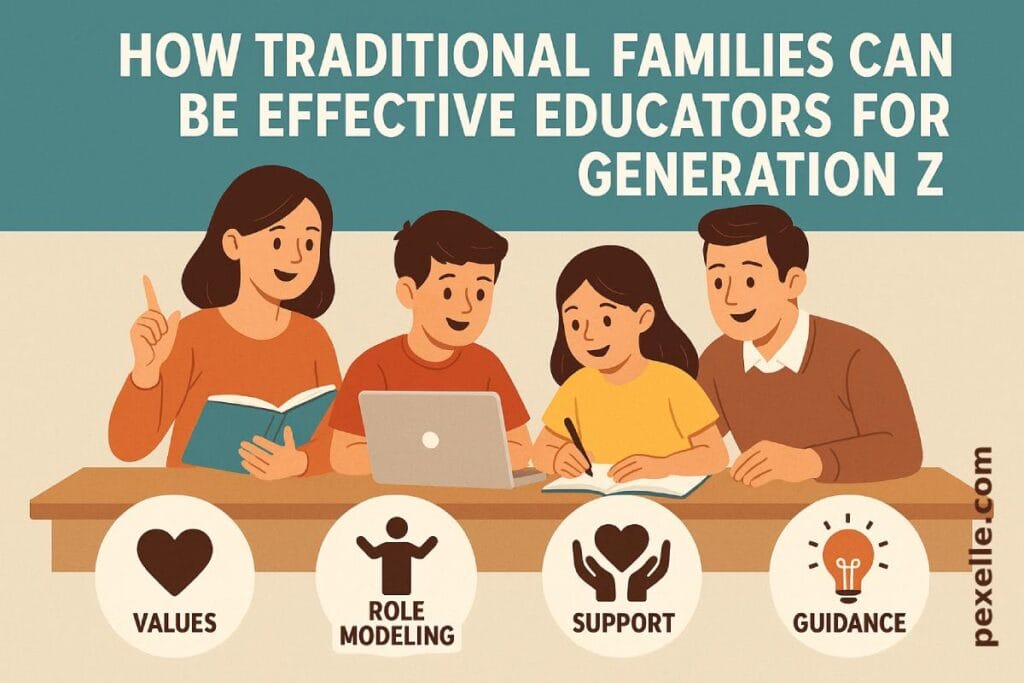How Traditional Families Can Be Effective Educators for Generation Z

In a rapidly changing digital world, Generation Z—those born roughly between 1997 and 2012—are growing up with unprecedented access to technology, information, and global culture. While their learning often stems from screens and networks, there is still a crucial role for traditional families in guiding their development. Despite their seemingly outdated ways, traditional households can offer timeless lessons that complement and stabilize the hyper-modern world in which Gen Z lives.
1. Instilling Core Values and Emotional Intelligence
Traditional families often emphasize values such as respect, responsibility, humility, and gratitude. These values, passed down through generations, form a strong moral compass. Gen Z, who often experience fragmented attention and overstimulation from digital environments, benefit immensely from the grounded emotional guidance that traditional family settings provide. Simple acts like eating together, greeting elders, or participating in community rituals teach empathy, patience, and compassion—skills that algorithms and apps cannot convey.
2. Teaching Resilience Through Real-Life Experiences
In traditional families, children are often involved in daily tasks—chores, errands, or helping with family businesses. These activities may seem mundane, but they cultivate resilience, discipline, and perseverance. Unlike the instant gratification found in modern media, these real-life tasks require effort and patience. When Gen Z encounters setbacks in the real world, the lessons learned at home—how to handle disappointment, delay rewards, and push through difficulty—become invaluable tools for personal growth.
3. Bridging the Generational Gap Through Storytelling and Oral History
One of the richest teaching tools in traditional families is storytelling. Grandparents and elders share experiences of hardship, migration, war, or survival—stories that instill perspective, gratitude, and identity. For Gen Z, who are often searching for belonging in a fragmented global culture, these narratives provide a sense of heritage and continuity. Understanding where they come from empowers them to understand where they are going.
4. Encouraging Community-Oriented Mindsets
Traditional families usually place importance on extended family ties, neighborly relationships, and collective responsibility. Gen Z, although globally connected, may lack real-world social connections. When traditional families include them in weddings, funerals, religious gatherings, or community service, it fosters a sense of social cohesion and civic responsibility. These experiences develop leadership, collaboration, and social awareness—traits often lost in isolated digital interactions.
5. Balancing Modern Technology with Ethical Guidance
Traditional families do not have to reject modern tools to be effective educators. Instead, they can provide a balanced framework. By guiding how and when technology is used—setting screen time boundaries, discussing online behavior, and promoting offline hobbies—they can teach Gen Z how to live consciously in a digital age. This harmony of old and new equips the younger generation to benefit from technology without being dominated by it.
Conclusion
The wisdom of traditional families does not lie in resisting change, but in offering a moral, emotional, and cultural compass to navigate that change. While schools and smartphones may teach Gen Z about the world, traditional families teach them how to live in it—with dignity, resilience, and purpose. Far from being obsolete, these families can be the most vital educators of all—shaping not just what Gen Z knows, but who they become.
Source : Medium.com



